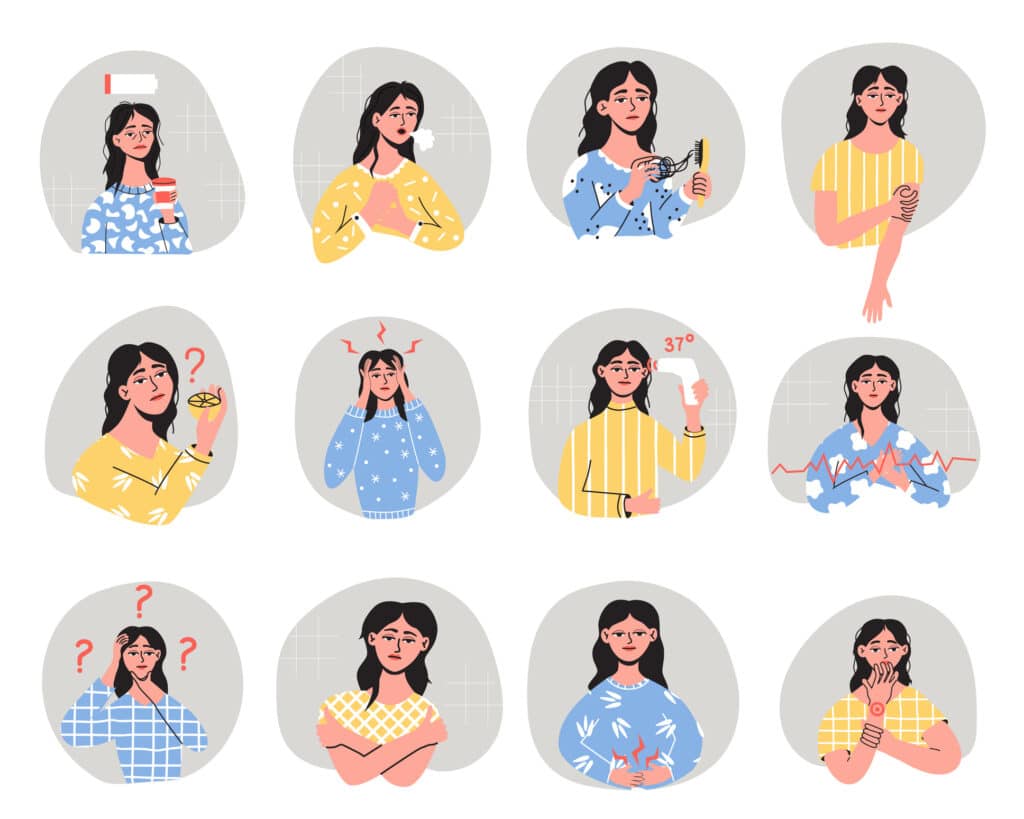
By Diana Kelly Levey
Long COVID is categorized as a chronic illness following the infection of COVID-19 that seems to impact about 10 to 25 percent of patients. Even if you aren’t experiencing these symptoms right now, recent research published in SN Comprehensive Clinical Medicine finds that anyone infected with COVID-19 is at high risk for developing long-term neurological complications, such as “brain fog” or cognitive impairment.
“Brain fog” also includes problems with inattention, memory recall, language fluency, executive functions and how fast the brain processes things. Some of these symptoms are similar to those for adult ADHD, a mental health disorder with persistent patterns of inattention, distractibility, hyperactivity and impulsivity.
If you contracted COVID in the early years of the pandemic and still haven’t felt like your brain was up to its usual speedy self or you’ve struggled with attention, you might be wondering if you’re experiencing long COVID symptoms. Or you may wonder if they are symptoms of your diagnosed — or undiagnosed — ADHD.
It’s important to ask yourself if cognitive issues you’re experiencing — like trouble concentrating and inattention — came about after you contracted COVID. Or, if perhaps you noticed cognitive challenges throughout adulthood and these symptoms came to light during or after the pandemic.
People who don’t fare well cognitively with COVID are people who have predisposing factors that affect their executive functioning. Those factors might include chronic fatigue, depression, anxiety and other chronic medical illnesses like cancer or fibromyalgia, says Bruce Bassi, MD, medical director and founder of TelePsychHealth.com.
“They already have a poor ‘cognitive reserve’ at baseline,” Dr. Bassi says. Their depression and anxiety are very distracting to them, so to speak, they can’t function or focus on the tasks at hand because of these other internal distractors of their own depressive or anxious thoughts, and slowed cognition.
You could be experiencing long-haul COVID symptoms even if you were asymptomatic or had mild symptoms from a COVID infection, according to a study in the journal Clinical Nursing Research.
“We’re seeing some patients come into the hospital with long-haul symptoms that are lasting for weeks and months,” says Naomi Jean-Baptiste, MD, a board-certified ER physician working in Florida and founder of Hope4Med, a private membership company that helps healthcare professionals combat burnout and maintain a healthy balance of mental health and well-being. “Sometimes, those symptoms are associated with respiratory problems, but we’re also seeing some people that come in with what is termed ‘brain fog.'”
How to Determine If It Is Adult ADHD
Whether or not you were infected with COVID and are experiencing concentration issues or cognitive struggles, if you suspect you have adult ADHD, it’s best to get tested by a mental health professional.
“If there’s a patient who is wondering whether or not they have ADHD in response to long-haul COVID symptoms, a psychiatrist is going to try to understand the timeline of when they had their ADHD symptoms,” says Dr. Bassi. “Outlining when your symptoms started, what kind of impact they had, and if they had preceded your COVID infection will help us understand if you have ADHD, long COVID, or both.”
If the symptoms also were present in childhood and adolescence, that’s a much stronger likelihood that a person should have a separate ADHD diagnosis, Dr. Bassi says.
“If someone is experiencing the cognitive side effects of mental fatigue and poor cognitive processing speed due to COVID, I wouldn’t necessarily classify them with ADHD based on that information alone. It’s better explained by a medical illness,” Dr. Bassi says. “There are a number of other medical illnesses like anemia and hypothyroidism that can present like ADHD and a good doctor would treat the underlying issue, not the symptoms on top of the issue.”
Think about the timeline of when those issues started, he advises. “It is possible that a patient has had both adult ADHD and long-haul COVID symptoms and they’re finally getting around to saying, ‘I want this treated,'” Dr. Bassi says.
How is Brain Fog Similar to ADHD Symptoms?
ADHD is one of the most common neurodevelopmental disorders in childhood, says Dr. Jean-Baptiste. While those behaviors are usually noticed earlier in life, many more adults are now being diagnosed with adult ADHD later in life, she says.
The prefrontal cortex may be the root of the similarities in symptoms of ADHD and long-haul COVID symptoms such as memory and brain fog problems, she says.
That’s because both long-haul COVID and ADHD impact your prefrontal cortex. With ADHD, delayed maturity of the prefrontal cortex can cause neurological dysfunction symptoms. The prefrontal cortex is responsible for executive function, which includes planning, decision-making, working memory, problem-solving and even controlling your impulses.
Some research, like that published in the Journal of Alzheimer’s Disease, suggests that the COVID-19 virus targeted the brain’s frontal lobes, impacting behavior and cognitive functioning.
Dr. Bassi’s recommendation to people experiencing some of these symptoms: Find a good therapist to talk about what you could be doing in terms of behavioral activation techniques and small steps to get back on track. And that advice would be for somone with long COVID or ADHD, he says.
Science Shows Promise for Treating Brain Fog and Attention Problems
Non-stimulant medications can be part of a treatment program to control symptoms of ADHD, like attention and impulsivity. And research has shown some non-stimulants can help with inattentive symptoms and brain fog associated with long-haul COVID.
More research is needed to help experts understand how to treat and possibly reverse long-haul COVID symptoms.
One small study published in the Journal of Attention Disorders documented the treatment of a patient who experienced inattention symptoms after COVID. He was treated with methylphenidate, lisdexamfetamine and eventually, Bupropion, which helped his symptoms go into remission.
Are you considering getting an assessment for ADHD? ADHD Online offers an online assessment for ADHD in all 50 states. We work with a network of doctorate-level psychologists to evaluate all assessments and provide a diagnosis if appropriate.





